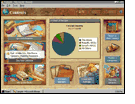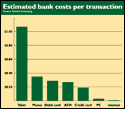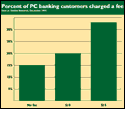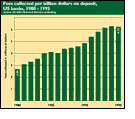July 1, 1996
Click on illustrations for expanded view and source information.
Banking from Home
Benefits for Banks
Consumers Paying Increasing Fees
Links Relating to the Story
 When Marquette Banks launched the first consumer PC banking service in the Twin Cities last year, Jim Reinhardt was among the first in line. Because he got in early, he doesn't have to pay the ten dollar monthly fee for banking and bill paying services, and he likes PC banking a lot.
When Marquette Banks launched the first consumer PC banking service in the Twin Cities last year, Jim Reinhardt was among the first in line. Because he got in early, he doesn't have to pay the ten dollar monthly fee for banking and bill paying services, and he likes PC banking a lot.
I probably write 100 to 150 checks, or probably 100 to 150 transactions a month, and it takes about half the time, if that, to do my balancing.(SFX: Several children playing noisily.)
Reinhardt and his wife Nadine live in a tidy suburban Twin Cities home with their six kids. Six children age eight and under don't leave the Reinhardts with a lot of time or money to spare. Nadine Reinhardt says PC banking means Jim doesn't have to go to the bank, and that frees up time for both of them.
To me fifteen minutes is fifteen minutes. You know, so the extra time that I do have is magnified, more than maybe the average.The Reinhardts already kept most of the family books on computer, so Jim wasn't intimidated by the idea of banking by modem.
(SFX: Modem tones.)
Now it's sending some of the information to me. It automatically downloads all my transactions, so when I go on line, it cuts down data entry. It basically puts it all in for me and all I do is verify the fact that on that date, yes indeed, that was $10.Benefits for Banks
The convenience of banking from home is the big selling point for consumers. Banks are interested because PC banking appears to help them capture more of an individual's financial business ... or "wallet share" as it's called in the industry.
Bankers don't like to talk about another potential benefit to PC banking, but Mark Chapman does. Chapman runs a company called CFI Pro Services1 that sells a PC banking system to banks.
They're gonna save themselves a ton of money by virtue of getting the customer, in essence, to do the work.
 One often-cited study2 found that each teller transaction costs a bank one dollar, seven cents. When done by the customer via personal computer, the same transaction costs three cents.
One often-cited study2 found that each teller transaction costs a bank one dollar, seven cents. When done by the customer via personal computer, the same transaction costs three cents.
But the study does not account for the costs of installing PC banking systems, and that can exceed one hundred million dollars.
Dan Herbeck, head of Marquette's PC banking program3 says banks don't save money until the number of users reaches a critical mass..
At this point in time, I don't think it's saving quite the amount of money that people would think for banks, because we're still relatively new in this, and we still need to maintain all of our paper-based systems.Paul Getman, a banking industry specialist for Regional Financial Associates4 in Pennsylvania, says high costs and low enrollment mean PC banking is actually losing big money for most banks.
But I think over time PC banking probably will at least break even and may even be a profit center for some banks, but more importantly it will allow banks to reduce their costs, principally in their bank branches. And I think that's the ultimate goal of PC banking.Recent studies indicate consumers are interested in PC banking, especially people earning 75 thousand dollars a year or more ... the kind of customers bankers covet. But PC banking has spread at a glacial pace. Clunky software, the lack of modems in personal computers and lack of trust generally got the blame. But Mark Chapman of CFI Pro Services says banks are the main culprits.
The single biggest thing that retarded the growth of home banking is the focus of the commercial banking industry on this as a way to get fees.
 An independent survey found more than half of consumers banking online pay a fee of 10
dollars a month or more. However the survey found fees are NOT a major
impediment to the growth of PC banking. Banks that charge for online
banking and bill paying, say the service can actually save money
in the long run, because customers spend less on checks and stamps.
An independent survey found more than half of consumers banking online pay a fee of 10
dollars a month or more. However the survey found fees are NOT a major
impediment to the growth of PC banking. Banks that charge for online
banking and bill paying, say the service can actually save money
in the long run, because customers spend less on checks and stamps.
But the experience of banking behemoth Citibank5 offers powerful evidence fees take a heavy toll on public interest in banking online. Citibank has offered the service for ten years, and charged a fee until last year. Spokeswoman Susan Weeks says dropping the fee cost Citibank about ten million dollars. But the number of customers using the service grew sixfold.
The result was better than we expected. We knew that price had become a barrier to people trying personal computer banking, but we didn't realize the floodgate that would open when we lifted the price entirely off everything.Consumers Paying Increasing Fees
Citibank's decision flies in the face of a longstanding trend in banking. Since deregulation in the early 1980's, banks have steadily increased the fees they charge customers ... some even have charged for using tellers.
 According to government data6, for every dollar on deposit, commercial bank customers are paying more than double the fees they paid in 1980 for ATM use, bounced checks and other service charges. It's not possible to do the same analysis with the data available for S&L's.
According to government data6, for every dollar on deposit, commercial bank customers are paying more than double the fees they paid in 1980 for ATM use, bounced checks and other service charges. It's not possible to do the same analysis with the data available for S&L's.
The American Bankers Association7 says the increase reflects the expense of providing a growing array of banking services and higher costs, including interest payments on checking accounts.
But Mark Chapman of CFI Pro Services says when it comes to PC banking, the industry saw an opportunity to CUT costs AND RAISE revenues. Chapman says it could be called a strategy to charge customers for the privilege of saving banks some money.
The fact of the matter is that the financial institution is saving money by virtue of these transactions, and really shouldn't be charging incremental fees to the people who cost them less. I mean it's 180 degrees off from the reward structure you'd want to have for your consumers.Should YOU turn your keyboard into a teller? Some who've tried it found it no more convenient. Jim Reinhardt recommends PC banking, but he's not sure its worth the $9.95 Marquette charges other customers for banking and bill paying. And Reinhardt found switching banks isn't easy.
I ended up having some fees, you know, like I had insufficient funds because there were some checks that were outstanding, and I had already taken everything out, and I thought they were all cleared, that sort of thing, so that was a hassle.Waiting a while may save some hassles. Industry observers say competition will drive more banks to offer PC banking, and will force them to reduce, if not eliminate the fees.
 For Minnesota Public Radio, I'm Bill Catlin.
For Minnesota Public Radio, I'm Bill Catlin.
Links Relating to the Story
Please note: Links are provided for reference purposes only. Minnesota Public Radio has not evaluated the information provided on these sites, and their appearance here does not constitute any endorsement.
1. CFI Pro Services homepage.
2. Homepage for Gemini Consulting, a "global management consulting firm"
3. Marquette Banks' page about its online banking service, Marquette Direct.
4. Regional Financial Associates homepage, includes access to economic indicator information.
5. Citibank's homepage.
6. Federal Deposit Insurance Corporation gopher provides access to tables of banking information
7. The American Bankers Association Web site includes "information about ABA, its subsidiaries and affiliates, and items of interest to consumers."
